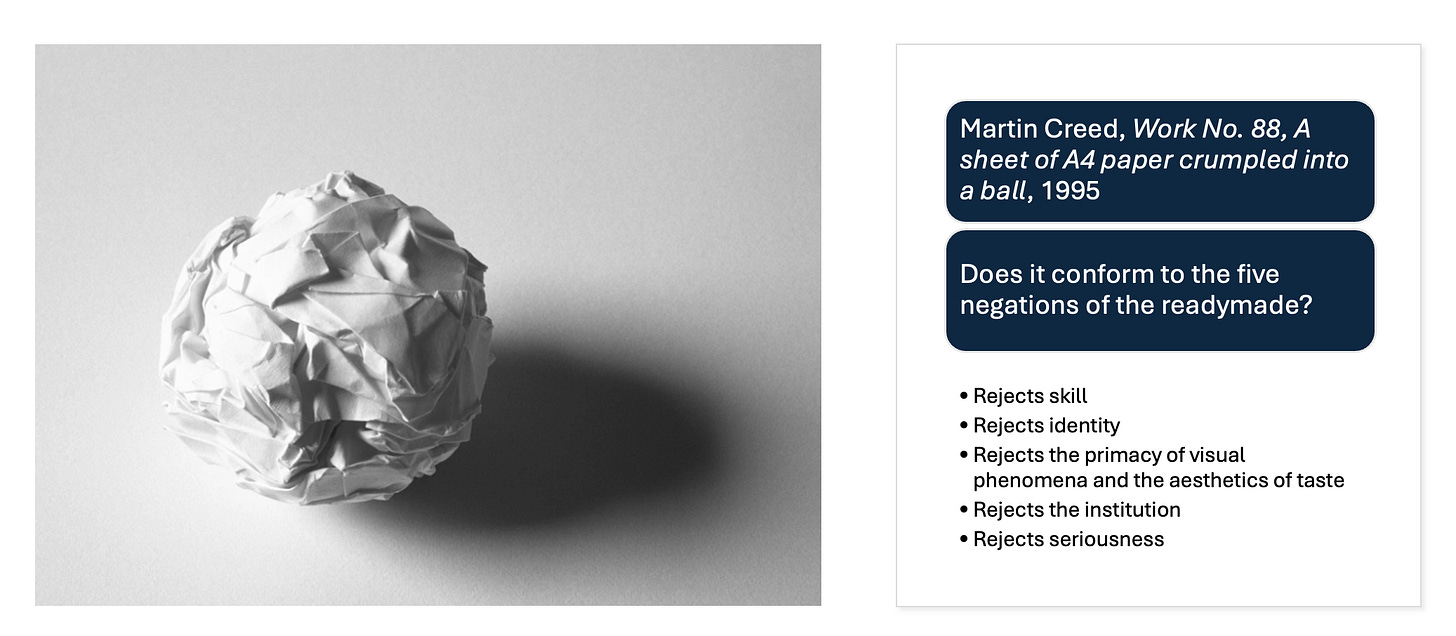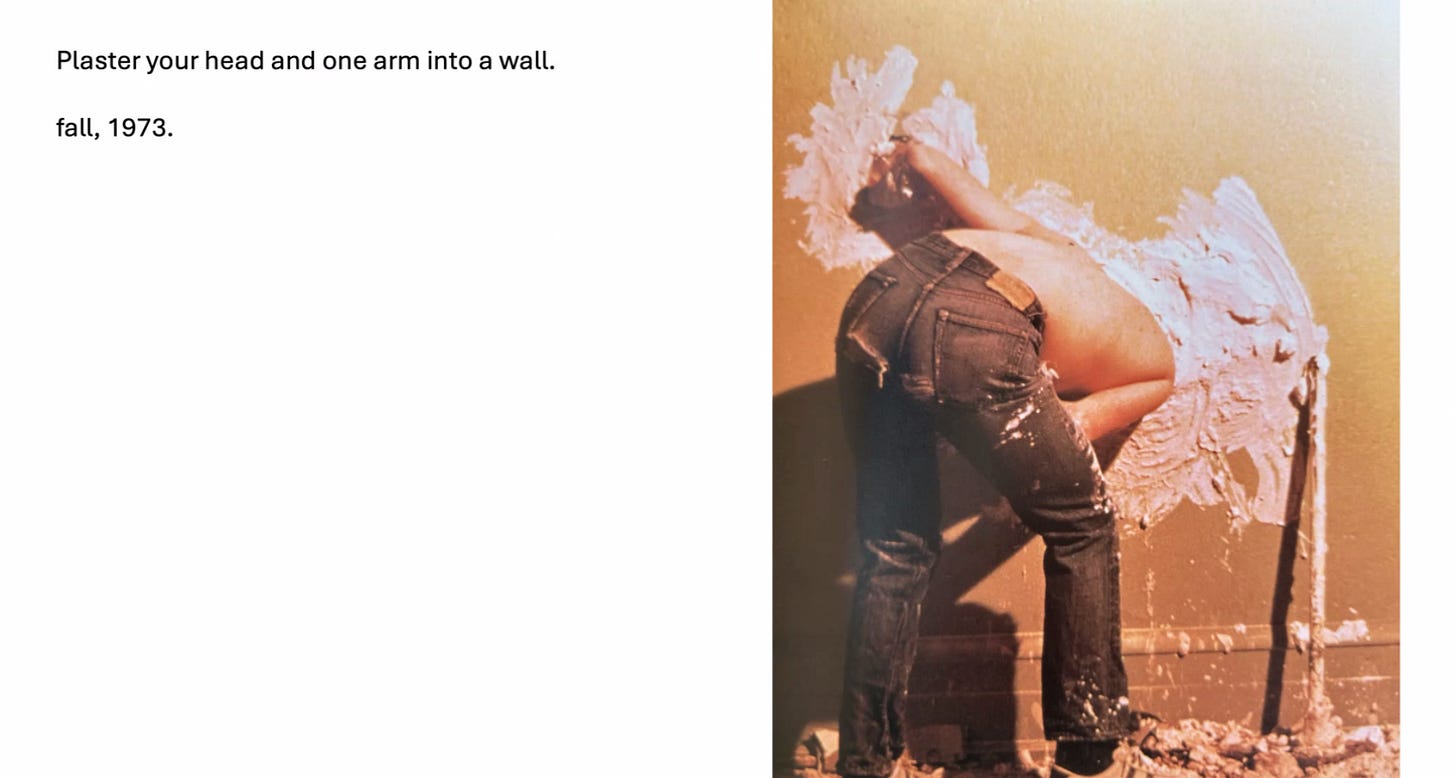How to learn
I was going to say that 2025 has so far been a year of highs and lows, but it’s probably more accurate (because things don’t separate out into simply good and simply bad) to say it’s been a year of different kinds of intensity. One of the highlights has been the weekly lecture-discussions I’ve had with my friend Simon Morris. At the start of the year I was reading about conceptual art in the 1960s and 1970s – like Sol LeWitt's Wall Drawing #118 (1971): written instructions for artists to connect 50 points on a wall with straight lines; or Argentine artist Marta Minujín’s Reading the news (1965), where she got into the Río de La Plata wrapped in newspapers.
I fancied doing a course in this kind of thing at somewhere like Goldsmiths. Simon is a Professor of Art so I asked him. ‘Don’t go to Goldsmiths, it’s so expensive. I’ll teach you.’ Simon offered 12 one-to-one lectures as long I would buy him a box of his favourite red wine. He’d set a little bit of reading in advance, and we’d meet for an hour on Zoom, once a week or once a fortnight, and he’d have a slide-show and we’d talk. The first 6 weeks looked like this:
0. Induction –how to read works of art
1. Dada, Marcel Duchamp, the Readymade & Ugly Art: Marcel Duchamp, Hugo Ball, Tristan Tzara, Hans Arp
2. Deconstructing Popular Culture: the art work of Paul McCarthy
3. Post-Feminist Strategies in Contemporary Art: Double Game -the art work of Sophie Calle
4. making nothing happen: Pavel Büchler
5. Binary Oppositions: Case Studies 1) William de Kooning & Jasper Johns 2) Anthony Caro & Richard Long
I CANNOT DESCRIBE HOW GOOD THIS ALL IS. It’s good partly because Simon is brilliant and funny, and partly because I love this material. Here’s a slide from the Martin Creed bit:
And this from today’s lecture on Paul McCarthy:
Forget Monet’s Haystacks, Paul McCarthy plastered his head into a wall.
But my point isn’t really about the content. The main thrill was learning new stuff (particularly when I’m used to dispensing it), and also – and especially – in finding a different way to share knowledge, outside the formalities of the university seminar or its equivalent. Everyone knows something, so why don’t we share? How about we / I / you set up a group in which you exchange knowledge, but not for money? I’ll do 2 sessions on making the perfect beef wellington, and you can do 1 on how to change a car tyre and a second on John Donne’s repressed Catholicism. Or the history of ferns. Or complex equations. Or the 1994 World Cup. Or beginning Latin. Or ANYTHING. The key would be (a) not to institutionalise it; (b) keep if financially free; (c) keep it one-to-one (something dies when there are 12 silent faces staring back); (d) keep it unassessed; (e) keep it light (by which I mean not easy, necessarily, or slight, but unencumbered, and not obliged); (f) don’t let AI go near it; and (g) let it do what the most exciting learning does – that is, connect, outwards, expansively and suddenly, to other things.




Great idea -- knowledge barter. I have a vague memory that something of the sort went on within the Hackney Community Housing squatting collective in the 1970s.
I'll happily teach anyone how to plaster their head into a wall in exchange for French lessons. Program:
1. Choosing a suitable wall (definitely not a party wall with your neighbour)
2. Making a hole in the wall
3. Mixing the plaster (white dental preferred to the pink stuff)
4. Inserting head into the hole
5. Applying the plaster
6. Letting it set (warning: it gets hot!)
7. Calling the Fire & Rescue service, possibly also an ambulance (same number)
The two-to-three-person reading groups I've been in have been extremely enjoyable along more-or-less (depending on existing expertise & available time for study) similar lines. I've enjoyed somewhat larger groups as well, but the broader social context can tend to adulterate the delightful aspects with laziness, stubborn prejudice, or simple shyness.